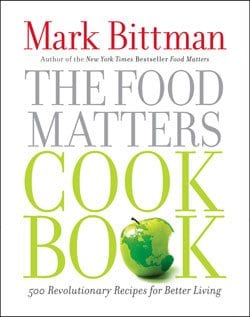
The earth is getting hotter and humans are getting fatter.
Scientific consensus concludes that in the past century, the planet has warmed by several degrees as the result of human activity. For humans, this change may have gone undetected, but for the environment it has not — polar ice caps and glaciers are melting, storms are growing stronger and droughts are lasting longer.
At the same time, humans face obesity as the newest health epidemic. More than one billion adults worldwide are overweight or obese, according to the World Health Organization. And in the United States, 73.7 percent of adults are overweight or obese, according to the Centers for Disease Control.
For author Mark Bittman, food connects these two issues — it is much of the problem, but can also be much of the solution. Poor eating habits have not only led to the nation’s obesity epidemic, but have also contributed to global warming, deforestation and pollution.
In his newest book, “The Food Matters Cookbook: 500 Revolutionary Recipes for Better Living,” Bittman pushes the case for better eating — for the sake of personal health and the natural environment.
The veteran food writer for The New York Times is author of the weekly column “The Minimalist,” which also has a video component. Bittman was never formally trained as a chef, and has never worked in a restaurant. His cooking expertise has come largely from spending time in his kitchen at home.
Unlike other cookbooks, Bittman’s begins with a manifesto on food. He advocates what he calls “sane eating,” consuming mostly plants, few animal products and less junk.
“If you swap the basic proportions in your diet — increasing unprocessed fruits, vegetables, legumes, nuts, and whole grains,” he argues, “you’ll wind up losing weight and improving your overall health while also improving more difficult-to-measure situations like global warming, the environment in general, and animal welfare.”
“Sane eating” is the opposite of what most Americans practice. According to Bittman, Americans on average eat 200 pounds of meat each year, in addition to 237 pounds of dairy, and 32 pounds of eggs — totaling 469 pounds of animal products per person, per year.
Moreover, nearly a third of Americans’ calories come from nutrient-poor foods high in sugar, salt and fat. Seven percent of Americans’ calories come from soda alone.
And Bittman knows first hand the value of a plant-based diet. Despite his expertise, he found himself 35 pounds overweight, with high cholesterol and blood sugar, and sleep apnea. This prompted him to change his own diet to a largely plant-based one.
“I follow a strict vegan diet until dinnertime — eating only whole grains, beans, vegetables, fruit, nuts, and seeds. After that I eat whatever I want,” he explains. “That’s my way; your way may be different.”
In addition to the effects on his personal health, Bittman also changed his diet because of its effects on the environment.
Citing statistics from the environmental organization Worldwatch, he says that livestock and their by-products account for nearly half of the world’s greenhouse gas emissions. Consequently, “If each of us ate the equivalent of three fewer cheeseburgers a week, it would have the same impact on the environment as getting rid of all the SUVs in the country.”
This is because producing meat is extremely inefficient. While it only requires 2.2 calories of fossil fuel to grow 1 calorie of corn, he explains, 40 calories of fossil fuel are necessary to generate a calorie of meat. These excess fossil fuel calories come from land use, petroleum-based chemical fertilizers, pesticides, transportation, machinery and drugs.
Even more inefficient is the creation of junk food. “Producing a single can of calorie-free diet soda (which has no caloric or nutritional value) consumes 2,200 calories of energy,” he says.
At this rate, American levels of consumption are simply unsustainable, “It requires more land than exists and taxes the earth’s resources beyond what’s available.”
To counter this American-style diet, Bittman offers concise principles for sane eating: “eat fewer animal products than average”; “eat all the plants you can manage”; “make legumes and whole grains part of your life”; “avoid processed foods”; and “everything else is a treat — and you can have treats daily.”
The recipes that follow exemplify this description of “sane eating.” It is not a vegan cookbook — Bittman does not advocate veganism or vegetarianism — but reduces meat and dairy to sides and garnishes, and elevates plants to the centerpiece of meals.
The recipes range from decadent desserts — spicy carrot cake and cherry truffles — to hearty dinners — grilled vegetable and fresh tomato lasagna and chickpea tagine with bulgar and chicken — and flavorful sides — Mexican street corn, spicy-sweet green beans and vegetable-lentil soup.
And to assist the novice cook, the recipes are marked by preparation time and complexity, so even those without much kitchen experience can find hundreds of quick and easy recipes.
But Bittman is sure to stress that sane eating, unlike veganism and vegetarianism, is about “flexibility and forgiveness.”
“We do what we can, knowing that adjusting our food choices as individuals will have a cumulative effect on all the plants, animals, and humans that share our planet,” he says. “It’s the aggregate of all our small changes that will bring about bigger ones.”






